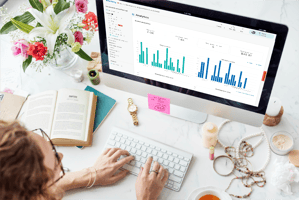Jese Gary, an experienced event organizer with a wealth of knowledge in the field, shares her...
The digital era of event planning
Table of contents
- From clipboards to cloud: the new reality of event management
- What is event planning automation?
- Streamlining core operations with eventeny's automated features
- Making the smooth transition to automation
- Embracing success through automated event management
- Frequently asked questions about event automation
- Final thoughts and resources
From clipboards to cloud: the new reality of event management
The way event planners organize and deliver successful events has changed dramatically over the last decade. Today, digital event planning is at the heart of the planning and execution process for everything from small community activities to large trade shows and festivals. If you are an event planner responsible for any type of event, you have probably noticed that handling every detail manually is becoming a thing of the past.
Traditionally, event managers relied on clipboards, spreadsheets, countless emails, and paper checklists. Managing vendors, volunteer schedules, ticketing, and sponsorships manually often lead to lost event details, missed deadlines, and last-minute stress. Communication with stakeholders could be slow, and getting real-time updates or insights on event goals was difficult. Even with the best marketing plan, a minor mistake could significantly impact the event's overall success.
Now, as digital event tools and event management software take center stage, entire workflows are moving into the cloud. Event planners can collaborate online, track progress from start to finish, and see results as they happen. Whether you’re planning a person event, a series of promotional events, or using virtual event platforms, digital tools bring clarity, speed, and control to the table.
Imagine planning a city festival, a community event, or a pride event. With event planning automation, you can invite vendors, accept registrations, process payments, and coordinate speakers all through one platform. The increased efficiency means more time for creativity and engagement—from social media promotions to detailed event execution. This approach works for every kind of event, not just major industry expos but also intimate networking sessions and hybrid experiences.
This guide takes you through the ins and outs of event planning automation. We’ll demystify the technology, showcase practical examples, and outline how the Eventeny platform supports each stage of the modern event journey. By the end, you’ll be equipped to use digital event planning tools for better outcomes and a smoother planning experience.
What is event planning automation?
Event planning automation uses technology to handle routine or complex tasks that once required manual work. At its core, it’s about making life easier for the event planner and offering better experiences for attendees, vendors, and sponsors alike. The right tools can help you manage all event details—guest registration, volunteer sign-ups, payment tracking, and post event surveys—and bring them into one organized system.
Here’s how automation is reshaping the events industry:
- Automated communications: Event management software can send scheduled updates to registered guests, keeping everyone informed. This reduces back-and-forth emails and manual reminders, creating a better guest experience and freeing up your workload.
- Centralized information: Automating data collection ensures you have all details—like registration lists, attendee preferences, and vendor requirements—in one place. When working on planning and execution for a big conference or a series of workshops, you can quickly access the information you need.
- Social media integrations: digital event planning tools can connect with your social channels. You can schedule event announcements, share live updates, and track engagement in real time to gauge the effectiveness of your digital marketing efforts.
- Automated reporting and post-event surveys: Collecting feedback is crucial for improving future events. Event management software lets attendees complete post-event surveys online, and automatically compiles the results for you. This supports data-driven decisions for your marketing plan and overall strategy.
Let’s look at a concrete example. Suppose you are organizing a city block party. In the past, you would coordinate food vendors via email, print paper forms for volunteers, and send physical tickets or rely on handwritten lists at the entry. With automation, you set up online registration, manage vendor applications through a platform, and let volunteers sign up for shifts digitally. Automated reminders and real time updates ensure everyone arrives at the right place and time. You can even set up a post-event survey to collect feedback within minutes of the closing ceremony.
Another key benefit of event planning automation is that it supports all event types and sizes. Whether you’re handling a trade show, a charity gala, or a virtual meeting attended by hundreds worldwide, digital tools ensure that every detail from invitations to attendee follow-ups are professionally managed.
Streamlining core operations with Eventeny's automated features
An effective event planner needs strong systems for every part of the process. Eventeny has equipped its platform with a wide range of features designed to simplify the core operations of event planning. Here’s how you can leverage these tools, no matter the type of event you’re working on:
Vendor and exhibitor management
Accepting and tracking vendor applications is much simpler with Eventeny. Instead of sorting through piles of paperwork or endless email threads, vendors submit their entries online. You can build custom application forms that match your event needs—whether you require food permits, insurance documents, or booth preferences.
Once submitted, applications are reviewed in a centralized dashboard. You can communicate with vendors, approve or decline their participation, collect fees securely, and assign them specific locations on an interactive event map. This digital event planning feature not only saves time but provides a transparent and organized process for all involved.
Volunteer coordination
For events that need volunteers—like local festivals, nonprofit fundraisers, or city celebrations—Eventeny’s volunteer management tool automates sign-ups, shift scheduling, confirmation emails, and hour tracking. Volunteers can choose the shifts that suit them, view event details online, and receive automatic reminders about their roles. For you, no more chasing volunteers with calls or texts, as all communication flows through a single platform. This also helps you compile real time reports, valuable for managing large teams or planning future events.
that suit them, view event details online, and receive automatic reminders about their roles. For you, no more chasing volunteers with calls or texts, as all communication flows through a single platform. This also helps you compile real time reports, valuable for managing large teams or planning future events.
Ticketing and attendee management
A successful event relies on smooth attendee experiences. Eventeny makes ticketing and registration easy for both planners and guests. Set up ticket types, manage registrations, and process payments—all within the platform. Automated ticket emails and barcode scanning allow fast, contactless check-ins on event day. Real time attendee tracking helps your team monitor crowd size or respond quickly if a change is needed.
These capabilities are especially helpful for conferences, live shows, or community gatherings. By integrating ticketing with your event management software, you reduce the risk of lost tickets, enable accurate headcounts, and simplify reporting for post event analysis.
Sponsorship management
Securing sponsors is often key to a strong event marketing plan. With Eventeny, sponsorship proposals, deliverables, and communications are all automated and trackable. From sending digital proposals to invoicing and post-event reporting, sponsors have a clear view of their involvement and your team is less likely to overlook important commitments.
Integrated communication and marketing
Eventeny helps you reach your audience where they are. Built-in communication tools let you send updates to attendees, vendors, and sponsors. You can also integrate with your digital marketing platforms or post regular updates on social media, boosting promotional events and awareness.
.png?width=400&height=266&name=Real-time%20communication%20and%20analytics%20(0-00-05-04).png) Robust analytics and feedback collection
Robust analytics and feedback collection
After the event, data is automatically gathered from attendance, ticket sales, and post event surveys. You can generate reports with a few clicks to see what worked, where to improve, and how your marketing plan influenced overall success.
Practical examples of automation in action
To understand how automation can improve your planning and execution, consider a few more scenarios:
- Community fun runs use volunteer scheduling and health waiver management, all automated for safety and ease.
-
Pride events can use digital event planning tools to manage parade routes, vendor booths, volunteer coordination, and attendee engagement from one dashboard.
- Festival track logistics, send prep-material links, and share post event survey forms automatically to maximize learning outcomes.
Event planners for each of these examples achieve greater success with fewer errors, reduced manual workload, and improved attendee participation—all thanks to automation.
Making the smooth transition to automation
Adopting digital event planning and automation may seem overwhelming at first, but with a clear process it is manageable for any type of event or organization size. Here are some tips:
- Identify your priorities: Start by spotting the time-consuming jobs, such as registration management or attendee communication. Focus on automating one area first to build confidence and get quick wins.
- Engage your team: Involve everyone early in the transition. Show them the features most relevant to their roles, and encourage feedback about what tools help the most.
- Find the right platform: Look for event management software that fits your event size, audience, and budget. Eventeny can scale from small gatherings to large conventions.
- Set clear event goals: Automation lets you measure outcomes easily. Before you begin, decide on the key goals—sales, attendance, feedback scores—and choose automation tools that provide real time tracking on these metrics.
- Use training and support: Take advantage of help centers, user guides, and customer support offered by digital event tools. It increases adoption and helps your team solve problems quickly.
- Integrate with other tools: Modern platforms support digital marketing, social media, and other event technology. Make sure your solution connects with your website, analytics tools, and promotional platforms for seamless operations from start to finish.
- Test and review: Run through a small event or trial to see where automation helps most. Gather feedback via a post event survey to continue improving the process for future activities.
Embracing success through automated event management
Switching to automation is not just about making life easier—it’s about achieving better results. Here are some of the biggest benefits:
- Efficiency: automation reduces manual data entry, simplifies communication, and lets you handle tasks in less time.
- Accuracy: automated event management software removes the risk of lost information or overlooked tasks.
- Collaboration: teams work together smoothly, sharing updates in real time. This is especially important for events with many moving parts, such as multi-session conferences or regional roadshows.
- Better marketing and promotion: digital event planning tools and integration with social media boost your event marketing efforts. Schedule posts, send reminders, and track the effectiveness of every channel—all through one dashboard.
- Data-driven improvements: with analytics and easy post event survey tools, your event planner team can see what worked and set goals for future events.
Let’s consider another example. An arts festival organizer uses automated communications to keep exhibitors, food vendors, and ticket buyers up to date. On event day, real time notifications inform volunteers about schedule changes or urgent needs. Afterward, automated surveys collect feedback, giving insights for next year’s planning and execution. Whether the event was in-person, virtual, or hybrid, automation delivers value every step of the way.
Frequently asked questions about event automation
What event types benefit most from automation?
Almost every event, from small workshops to large expos and conventions, benefits from automation. The tools scale to fit your needs, whether you run recurring corporate meetings, non-profit galas, or public festivals.
Can automation help with virtual events?
Yes, digital event planning and virtual event platforms are designed for both in-person and online experiences. Automating attendee access, session sign-ups, chatroom moderation, and feedback surveys ensures your virtual event runs smoothly.
Is it difficult to switch from manual to automated systems?
Not at all, especially with supportive event management software like Eventeny. The key is to start small, train your team, and grow your use of automation as you see the benefits.
How does automation help with marketing?
Event planners can use automated tools to post on social media, send email campaigns, and measure real time engagement. You can target your marketing plan more precisely and boost interest in your promotional events.
What about data security?
Leading event management platforms invest in data protection and secure online payments, keeping your information and your attendees’ details safe.
Final thoughts and resources
The digital era of event planning has made running successful events more accessible and less stressful than ever. Automation is more than just a convenience; it represents a new standard for planning and execution in the events industry. Whether your event goals focus on education, networking, sales, or community building, event management software empowers you to deliver outstanding experiences from start to finish.
By embracing digital event planning and integrated tools—such as those found on the Eventeny platform—you streamline your workflow, enhance marketing efforts, and reach your full potential as an event planner.





